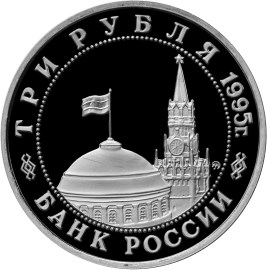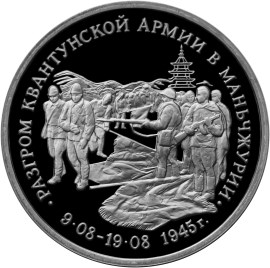The Defeat of the Kwangtung Army by Soviet Troops in Manchuria
Obverse
in the center — a view of the dome of the Senate building and the Saviour's Tower of the Moscow Kremlin, to the right - the mint trademark. The inscriptions along the rim framed by a circle of dots: at the top — «ТРИ РУБЛЯ 1995 г.» (THREE RUBLES 1995), at the bottom — «БАНК РОССИИ» (BANK OF RUSSIA).
Reverse
Japanese soldiers throwing to the feet of Soviet soldiers the colours of the Kwangtung army defeated in Manchuria, the inscriptions along the rim separated by two dots: at the top - "РАЗГРОМ КВАНТУНСКОЙ АРМИИ В МАНЖУРИИ" (THE DEFEAT OF KWANGTUN ARMY IN MANCHURIA), at the bottom - "09.08.- 19.08 1945 г.". The edge - two incised insriptions "ТРИ РУБЛЯ" (THREE RUBLES) separated by two asterisks.
Authors
The artist: A.A. Kolodkin
The sculptor: A.S. Khazov
Moscow Mint (ММД)
The year 1945 was the last year of the hard-fought battles against the Fascist Germany. Pushing to Berlin, the Soviet Army liberated Warsaw, Budapest, Koenigsberg, Vienna and Prague. The war in Europe ended on May 8 when representatives of the Allied Supreme Commands signed the instrument of unconditional capitulation of Fascism Germany. On August 9 the Soviet Union entered into the war against Japan, concentrating its war effort on the regions of the Far East where the principal Japanese ground forces, the Kwangtung army, were deployed. Its defeat forced Japan to surrender unconditionally. The instrument of capitulation was signed by representatives of the Soviet Union, the United States, Great Britain and Japan aboard the US battleship "Missouri" on September 2, 1945.


